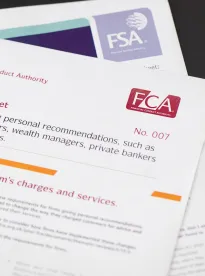This GT Alert covers the following:
-
To increase efficiency and as part of its wider Transformation Programme, the UK Financial Conduct Authority (FCA) has changed the way that it makes key decisions about firms and individuals.
-
These changes impact contested authorisations, Supervisory interventions and whenever the regulator seeks to commence civil or criminal proceedings.
-
The changes are controversial primarily because the FCA’s Regulatory Decisions Committee, long considered a safeguard of independence and a certain standard of decision-making, will now not normally be involved in these areas.
Discussion
To expedite decisions to prevent or stop consumer harm, the FCA has implemented a controversial change to its decision-making procedures. The change forms part of the FCA’s wide-ranging “Transformation Programme” that seeks (in summary) to make the regulator smarter, more proactive and more agile.
There has been considerable and wide-ranging criticism of the FCA in respect of recent high-profile business failures on its watch, most notably the failure of London Capital Finance (LCF) in early 2019. Dame Elizabeth Gloster’s review of the circumstances of the LCF failure included significant recommendations for the FCA that the regulator has accepted without demur. Indeed, the FCA has in some senses seized this moment of criticism to recast itself and to push through significant and controversial reforms, all in the name of self-improvement. However, some of these changes may risk unfair, unaccountable, and bad decision-making.
Summary of the Changes
The Regulatory Decisions Committee of the FCA (the RDC) has operational independence from its other functions. Its remit historically has been broad, from decision-making in Enforcement cases to whether the FCA should commence civil or criminal proceedings. Notwithstanding that the RDC is over-burdened and consequently sometimes slow, its independence and the ability (in certain circumstances) to make oral representations directly to the Committee make it a totem for fair and accountable FCA decision-making.
However, with immediate effect the role of the RDC is limited in the main to dealing with significant misconduct cases where the alleged misconduct has already occurred and there are (often complex) issues of law, fact, and sanctions to be resolved. The role of the RDC in respect of such cases will not change. In respect of other areas of decision-making, where harm has not yet occurred or is ongoing, the FCA will usually now make decisions through its executive procedures; these procedures themselves have been reformed in the name of greater agility. This change impacts:
-
Contested applications for FCA Authorisation or where the cancellation of FCA Authorisation is contested by the business.
-
Intervention in regulated businesses by the FCA by Supervisory Notice.
-
The decision by the FCA to commence civil or criminal proceedings.
In these categories the FCA will retain a strict separation of the decision makers and those gathering the relevant evidence to support the decision. However, the ability to make oral representations is now relegated to “exceptional circumstances” only. These are circumstances where the delays generated by written representations are unacceptable or where the relevant person or firm cannot make written representations. Therefore, in most cases, the respondent only will be able to make written representations in what is likely to be an existential matter for their business/livelihood. The efficacy of any written representations also has been dealt a blow in that the FCA will not give disclosure of communications between the staff recommending action and the decision-maker (something that is usually disclosed in respect of RDC decision-making). Therefore, it will be harder for respondents to address any hyperbole or legal/factual error by FCA staff.
Decisions made under executive procedures in this way can be challenged by a reference to the Upper Tribunal. This has all the time (and cost) implications that High Court litigation might entail. Therefore, whilst robust and independent, the Upper Tribunal does not offer swift justice and accountability, and it will not be something that everyone can avail themselves of, even if any harm done by a bad decision can be meaningfully rectified by a successful reference. Whilst the number of references to the Upper Tribunal may therefore increase as a result of these changes, a significant uptick would be surprising.
FCA’s New Form of Decision-Making Has Its Own Drawbacks
In reading the FCA policy statement (PS21/16), it is clear the bulk of respondents to the consultation objected to some or all of what was proposed. The previous decision-making landscape was not perfect, and careful, targeted reform was needed to increase efficiency, especially in cases of genuine urgency. However, even such careful reforms should have built-in checks that recognise (for example) the importance of oral representations or visibility of underlying discussions with decision makers. The FCA points out that many of the previous regime’s features were not mandated by the underlying legislation, but that does not justify taking away protections that have developed over the years. In making changes across the board and doing so in this manner, the FCA risks further setting back its credibility. No regulator can have a perfect record on preventing harm – the FCA will miss something significant again, savings will be lost, and confidence will be impacted. The FCA’s long-term credibility instead lies in its operating credible, fair, and robust processes.




 />i
/>i
